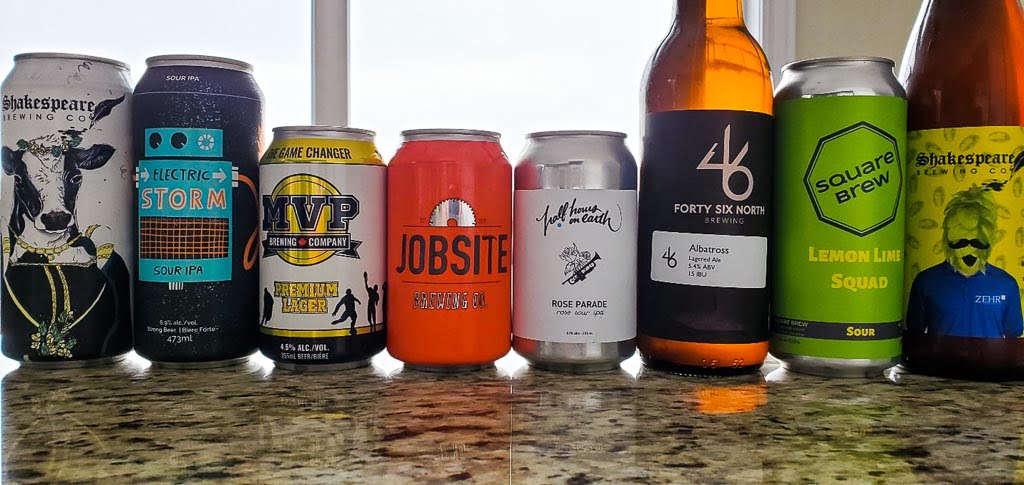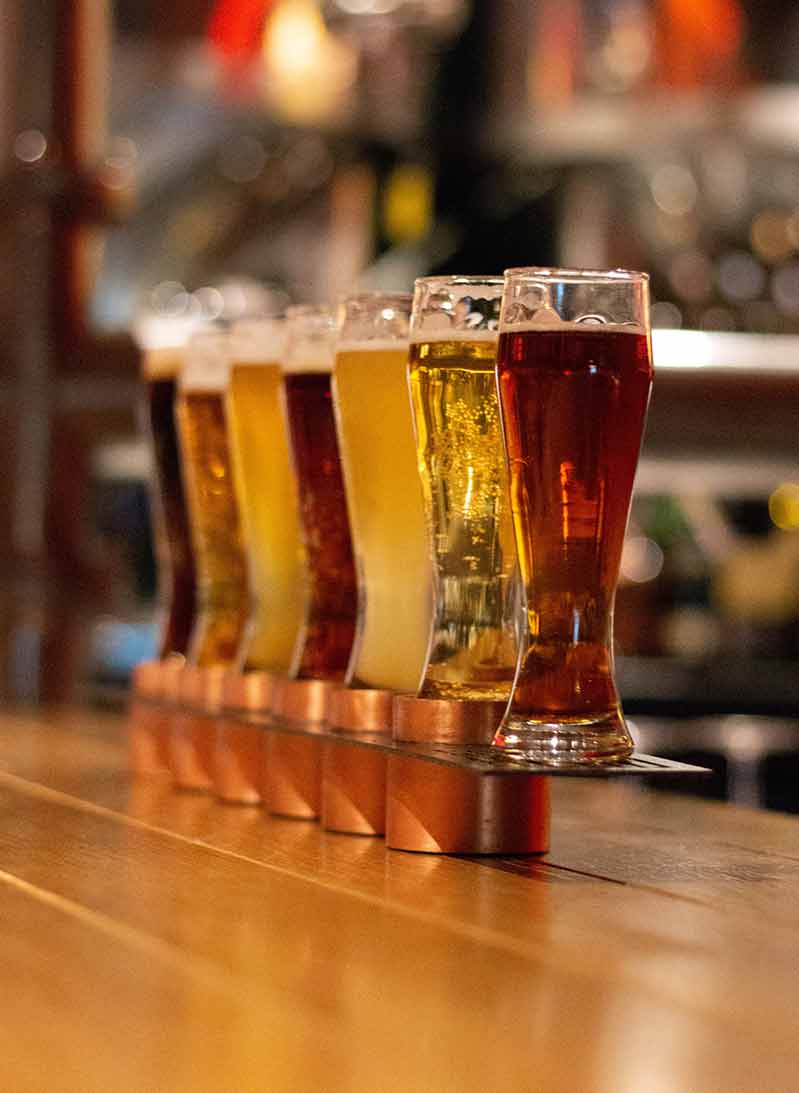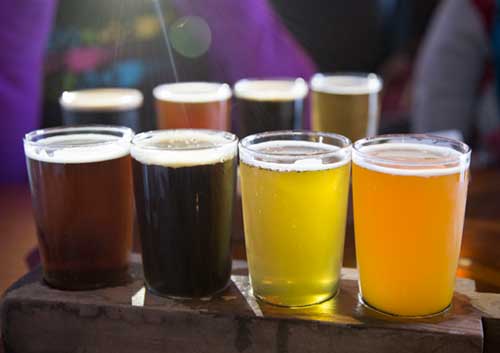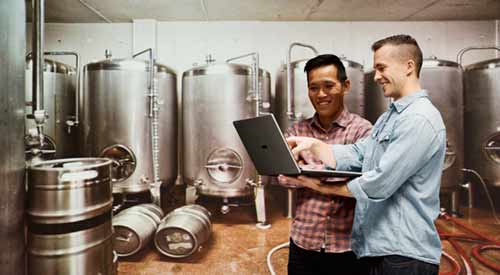Written by Richard Zehr and Jeremy Matheson
Fermenting and distilling water or juice with other ingredients has been used to purify and kill bacteria for thousands of years. There are references to alcoholic drinks throughout history and each variety served an important purpose for the people of the time whether socially, economically, or even religiously.
Let’s dive into some of the weirdest beer questions that I can think of, and maybe learn and appreciate what was done and can be done with a few simple ingredients to produce: BEER!
1. Why is my beer served warm?
Warm beer may not sound very refreshing, but your warm beer will have much more flavour than its ice-cold counterpart.
Science alert – and I am by no means a scientist. But our craft brewery clients are!
Temperature will influence the degree of taste on our tastebuds. Some flavour agents are more active at high temperature allowing your tastebuds to more easily identify notes of citrus, pine, cocoa, or caramel depending on the type of beer you are drinking.
This does not apply to all beers as all beers are not created equal. To really enjoy the full pallet of a craft beer, it is best served a few degrees warmer than a mass produced beer.
This is even more true with strong beer – beer with higher than 5% ABV.
Typically, this chart is where you want to serve your hopped or malted beverages.
2-4C: Mass market light lagers
4-7C: Czech and German pilsners, wheat beers, Kolsch
7-10C: IPAs, porters, most stouts
10-13C: Belgian ales, Scottish ales, sour ales
13-16C: Barleywines, imperial stout, Belgian strong ales
We can also look at some of the historical significance of these temperatures. Speaking broadly, the mass market lagers have been produced since there has been adequate refrigeration available. The European styled ales for example, have been produced long before there were ice buckets to keep your bottles frosty.
2.Why is my beer served with an inch of foam?
The following formally dressed science lesson is brought to you Ayden Gautreau who with his wife Katie, own and operate Shakespeare Brewing Company in Shakespeare, ON:
Most of us have that friend who just can’t seem to pour a good pint. They could be onto something though!
A nice layer of head should not be looked at like being cheated out of a couple ounces of beer. This foam is a good sign that the beer is being served with appropriate carbonation from both the brewing process and if you’re at the pub, from the keg.
Temperature also plays an important role in the formation of the beers head. Go figure! If the beer is too cold, it will produce less foam. This will impact the flavour of your beer, please see the above paragraph!
The sign of a clean glass is a nice layer of foam and also the beer leaving lace. Lacing is the foam left on the side of your glass. A dirty glass will not produce a nice collar nor lacing. The foam is like your cleanliness scale.
A beer with a good collar, or head, will help keep your beer fresh while you take the time to savour every sip. It locks in carbonation, flavour and freshness. The brewer took a lot of time to perfect their recipe, so don’t rush your drink!
3. Why should I care about IBU and how is it measured?
IBU stands for International Bitterness Units. This does not indicate how “hoppy” a beer is (I’ll get to that later) but refers to the class of bitter compounds found in the beer.
The IBU scale begins at 0 and goes up, up, up! Your standard lager sits at around 10 IBU.
You might be surprised to know what the IBU of your favourite craft beer is! Typically, it is stated on the can to aid in purchasing decisions for something that we have not tried yet.
The measurement of IBUs is a standardized system. This has been created through the American Society of Brewing Chemists. They really are scientists! It’s not just what the brewer feels is the right number for their beer.
The importance of an IBU calculation to a brewer is verification that their product is consistent. A beer that is brewed consistently by a brewery should typically come out with the same IBU. If it’s different, this could raise alarms that something is wrong with this particular batch.
4. Why should I care what kind of hops are in my beer?
Without the bitterness provided to a beer from hops, it could be like drinking sugar water. It’s the balance of flavours that really sets beer apart from other drinks.
Hops not only play a vital role in the flavour of the beer, they also help to preserve the beer! IPA was originally brewed with more hops & higher alcohol content to prevent spoilage on long sailing trips.
This history lesson is brought to you by Alex Menary. Founder & brewer at Square Brew Co. in Goderich, ON.
There are dozens of varieties of hops, but here are some hops that are available from The Tavistock Hop Co.
Rakau Alpha
These hops are from New Zealand, but grown in Tavistock, and have an aroma of stone fruit, red licorice, and grassy notes
Cascade Alpha
This is a versatile and used in many IPA styles. The flavouring is citrus and mango
Glacier Alpha:
Flavour notes of citrus, herbal, earthy and hints of fruit
Did you know that BrewON is an association that certifies locally sourced ingredients to make beer? Their logo on a beer means that it has been made with either 50-99% or 100% of hops grown in Ontario.
5. Other Beer Ingredients
Speaking of ingredients, there are four main ingredients that are used in the standard brewing practice. The Reinheitsgebot, or the Purity Law for German Beer of 1516, allows for nothing other than barley, hops, and water to produce beer. The importance of yeast in the brewing process was not fully understood in 1516 and the purity law was amended later. To this day, these 4 ingredients are still used by all beer! But this is not about the standard beer questions. This is about the WEIRDEST beer questions! So what is the weirdest beer ingredient?
Robin LeBlanc, co-host of the Ontario Craft Beer Guide Podcast once produced a one-off project called “Wurst Idea Ever” which was a sour ale brewed with added Brussel sprouts and smoked meat. Unfortunately, Robin admitted that idea was regrettable. Nothing ventured, nothing gained! There’s lots to be excited about with so many craft brewery owners continuing to experiment with adding interesting ingredients into their mash to produce unique beers.
Half Hours in Earth in Seaforth produces only sour beers (and operates carbon neutral) with varying amounts of fruit, like peaches and rhubarb, and flowers, like hibiscus and rose.
In the comments below, let us know what kind of ingredients you’ve used and if you’re surprised by the result!
Craft brewery insurance program!
As home brewers and craft brewery enthusiasts ourselves, it was the perfect opportunity to combine our insurance expertise with an industry we support. We like to partner with our brewery clients to make a ZehrBrew each year – you can read more about our last batch.
We’re also a sponsor of the The Ontario Craft Beer Guide The Podcast, to listen to one of our sponsored episodes click here!
Are you an Ontario craft brewery owner?
If yes, we would love the opportunity to work with your insurance program! Please read more about our specialized program by clicking the button below and let us know if you would like to be contacted for a brewery insurance policy review.











